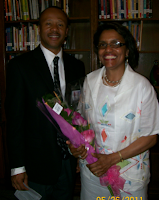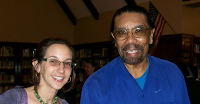At 7:00 pm on Thursday, May 26, the newly renovated Dwight Morrow High School Library reopened.
The affair was well attended. Administrators spoke and the orchestra from the Academy Program performed. A buffet style meal was served in the lobby outside the Library.
 |
| DMHS Principal, Dorian Milteer & Ms. Bickham |
Principal Dorian Milteer poses with Ms. Adrian Bickham. She is a Dwight Morrow Alumnus and faculty member. In listening to her speech it was refreshing to learn that many Englewood residents and alumni had felt the absence of a functioning Library in the high school.
 |
| DMHS Librarians |
Maureen Cushieri is the School Library Media Specialist. Cathy Robertson is the Library Clerk. It is not clear at this time, but Ms. Robertson seems to clerk in the middle school also. During a conversation in the hallway it was noted that neighboring towns are closing their libraries. I made the point that these towns do not have the low test and achievement scores that Englewood does. We need our libraries and knowledgeable, trained library personnel to operate them.
 |
| Board Member Harley Ungar & Thomas Coach Monroe |
Thomas "Coach" Monroe gave a history lesson on the development of the town of Englewood. Visit this link if you wish to hear Coach Monroe's telling of the history of Englewood. He is our local Griot. He spins an engaging history of the migration to and settling in Englewood by African Americans.
 |
| Library Conference Room |
The gigantic table in this room is the original table from the 1930's. Mr. Hunken informed me that most of the furniture and tables in the Library are original pieces from that time. "You would not believe the gum we scraped from the bottoms of those tables," he said. I told him that the tables at Harvard probably had the same amount of gum beneath them. He laughed and agreed with me. He also pointed out that the furniture and the space had been well cared for over the years. He apologized for the lack of air and promised that the problem would soon be remedied. The Library, conference room, and classroom next to it are very stuffy. These rooms are in desperate need of central air. I cannot imagine sitting in the sweltering heat of May and June in either place.
 |
| Classroom next to conference room |
The room in the photo to the right is located next door to the Library conference room. Based on the instuctional materials on the walls, it is assumed that a Literature class of some type is conducted there. It is small. The tightly closed windows are covered with colored construction paper. The paper blocks out the sun, the light and the air.
The task now is to fill the shelves with reading material that will both challenge and enlighten the student population. I have not seen signs of the classical literature and will be checking back at a later date to see how the books are being selected. It is of great importance that a cross section of Classical Literature and reference books that reflect the Mullticultural nature of the School and Community fill the shelves.



 process for reading/writing for ALL students in core English classes.
process for reading/writing for ALL students in core English classes. with benchmarks and assessments as well as effective
with benchmarks and assessments as well as effective  .
. in the process needed to
in the process needed to  for all students.
for all students. /coach to support instruction.
/coach to support instruction. .
. , revision, and
, revision, and  .
.
